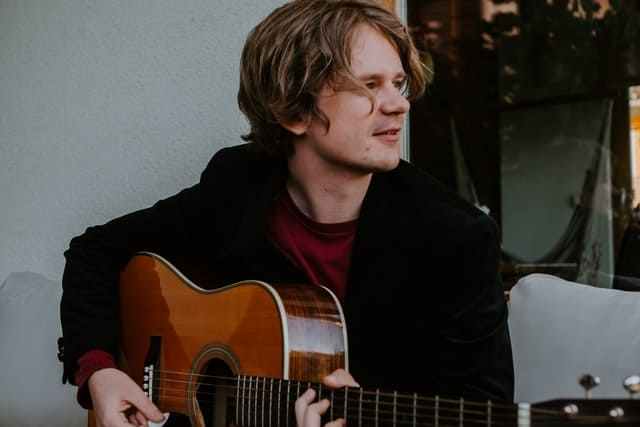The guitar is one of the most memorable instruments of them all.
It is no surprise then, to see thousands taking their first approach to music with a six-string.
Every year, a new learner gets his or her first guitar and starts taking lessons.
After a while, however, they may discover that they have some doubts regarding their decisions.
They may feel like stopping taking lessons, but they are not sure whether it is a good idea or not.
You should stop taking lessons when you feel you had enough, or you think classes are taking the joy out of playing. If that’s not the case, then it is better not to give up on lessons, since there is always room for improvement.
If you are still unsure, then the best thing you can do is keep reading this article.
It will clarify all your doubts!
Should you ever stop taking guitar lessons?
Lessons are important.
Even if you are an experienced guitarist, you should always take lessons.
Think about Guns N’ Roses bassist Duff McKagan, for example.
He’s a hell of a bass player, there is no denying that.
However, he took bass lessons in his late years, despite being the bassist of one of the greatest Hard Rock bands in the world.
What do we have to learn from this?
That there’s always room for learning, of course.
It doesn’t matter how much you know, there will always be something you don’t know about.
This fact applies to guitar, bass, and to every field you want to learn about.
You can be an expert in guitar, but who knows what you could learn with a tutor or private teacher?
What I’m trying to say is that you should stop taking lessons only if you feel like it.
Maybe you feel too much theory is ruining your creativity, or maybe it just bores you.
In that case, it is totally understandable. Say goodbye to lessons and focus on your music.
Now, if you don’t find a single problem with guitar lessons, you should never stop taking them.
How to know when it’s time to stop taking guitar lessons?
You may find lots of reasonable reasons to stop taking guitar lessons.
Which are they?
First, you need to stop taking lessons when you feel you are not progressing.
This happened to Tom Morello, guitarist of Rage Against the Machine and Audioslave.
He took his first guitar lesson, expecting to learn some riffs from his favorite bands, such as Detroit Rock City of KISS, or Black Dog by Led Zeppelin.
He was so disappointed, however, when the teacher forced him to learn the C major scale.
Believe it or not, Tom Morello took that single class and said goodbye to the guitar for many years.
Luckily, he had his revenge, and gave guitar another chance, this time, learning on his own.
Nowadays, Tom Morello is considered one of the greatest guitarists in the world of Rock music.
So, what do we have to learn from this story?
That many times, guitar lessons can backfire, and discourage you from playing.
In that case, it is better to either switch to a different teacher or stop taking lessons.
Second, you should stop taking lessons when you feel it’s enough.
Yes, I know I said that mastering your craft should be a never-ending journey, and I still believe you should stick to that idea.
Nonetheless, I’m aware that sometimes, a guitarist can feel that he or she has arrived at the wanted level.
In those cases, it is okay to give up guitar lessons.
Maybe you feel you had enough, and you are ready to play your music.
What’s great about this case is that you can always come back to them whenever you feel like it.
How to determine what’s your actual guitar level?
It is wise to ask for feedback to know your guitar level.
The best person you can count on that is, of course, your guitar teacher.
A teacher knows a lot about theory and techniques. This makes experienced teachers easier to detect the level of another player.
Simply ask your teacher for conscious and real feedback on your guitar abilities. Also, you can request the areas that need improvement.
Your strong points too, why not? One needs to be aware of both weaknesses and strengths.
If you don’t have a teacher, then simply approach any experienced guitarist or musician.
It can be a friend, a family member, a bandmate, or even the friend of a friend.
Anybody who plays guitar and can give you a reliable opinion.
It’s worth mentioning that you shouldn’t take it personally if you receive a negative review.
Take it as a fact. If you are a “bad” guitarist, it means that you need to practice more, that’s it.
Do not get discouraged. Being a beginner or average is just momentary.
The more you play, the more skills you develop.
Is there a point in still taking lessons if you are an advanced player?
There’s no doubt that taking lessons is always advantageous.
After all, there is no limit to learning.
An advanced guitarist who goes to a private teacher may end up learning different genres, for example.
Ultimately, this knowledge can be useful for new compositions, to name an example.
If not, one can simply learn a technique from a different approach or could improve his weak points.
Never take for granted what you can learn.
Consider switching guitar teachers to expand your horizons
I would like to encourage you to take lessons with different people.
This is a great idea for a variety of reasons.
First, you can broaden your knowledge, since different teachers may specialize in different fields. In the end, it helps to understand more about your instrument.
Second, it could help you master other genres you are not used to playing.
For example, you can be a great metal guitarist. But maybe your teacher is an expert at classical compositions.
In that case, you can transpose that knowledge to your favorite genre. Who knows what the results could be?
Lastly, think that it is not mandatory to learn solely from teachers.
You can take lessons while also adding some Youtube tutorials.
Sometimes, the best teacher is experienced, so maybe playing in a band or with a friend will be beneficial too.
Possibilities are endless.
All you need is the willingness and hunger for knowledge.
Good luck, and enjoy your process!

Hello there, my name is Ramiro and I’ve been playing guitar for almost 20 years. I’m obsessed with everything gear-related and I thought it might be worth sharing it. From guitars, pedals, amps, and synths to studio gear and production tips, I hope you find what I post here useful, and I’ll try my best to keep it entertaining also.





